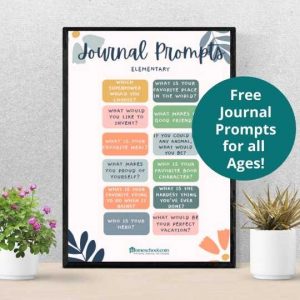
The Complete Guide to Homeschool Journaling
January 28, 2022As far back as I can remember, I’ve always been a sucker for pretty journals, notebooks, pens…any kind of writing supplies. Even as a kid, I loved collecting sparkly, pretty places to write thoughts, dreams, and quotes. I’ve recently been attempting to declutter my home, so I’ve undergone a purge, but I had an entire shelf in one bookcase dedicated to journals and notebooks. It doesn’t matter how many I already have, a trip to Target or TJ Maxx will occasionally result in me spending $5.00 and bringing home another. I use them for all different things. Some are full of sermon notes

from church, others have quotes from books that have helped me, and others are filled with random things like Bible verses, prayer requests, recipes, song lyrics, cleaning schedules, to-do lists, or things that were happening in my life that I wanted to remember. Collecting and writing in journals has been a constant throughout my teenage and adult years, and it has been beneficial to me in more ways than one.
You definitely do not have to invest in expensive notebooks or journals. Any notebook can be used… or you can even make your own! The benefits of journaling are not found in the book but in the act of writing. Let’s talk about some different types of journaling, their benefits, and how to use them in your homeschool to help your children.
Different Types of Journaling
There are so many different kinds of journaling…and there is no one “right” kind! The right one is the one you will use and enjoy! This list is by no means exhaustive, but these are some of the more popular kinds of journals.
- Bullet Journals: These have become very popular in the last several years because of their simplicity. They are completely customizable, budget-friendly, and perfect for those who thrive on list-making.
- Travel Journals: Planning a trip? Don’t forget to bring along a travel journal! These are great for remembering the details of a great trip. What was your favorite place you visited? Meal you ate? Person you met? Did you have an eventful experience getting to your destination? Write about it!
- Gratitude Journals: This is one of my favorite methods of journaling. It’s getting increasingly difficult for us as parents to raise grateful children in this entitled world. This is an amazing way to encourage gratitude and recognition of the blessings they have. (It’s great for us too!)
- Calendar Journals: These often have some overlap with bullet journals, but if you need more than a list, calendar journals are great to keep up with activities, plans, meals, games/practices, etc.
- Creative Journals: As you may expect, creative journals are great for creative people because there are no rules! I was born without that artistic gene so these tend to stress me out, but if you prefer freedom and including art in your journaling, this may be the one for you!
- Daily Journals: As the name implies, this is a journal you write in every day. Whether you want to keep up with what you’re eating, your exercise program, or whatever, these are great to begin the practice of writing daily.
How to Begin Journaling
It’s easy to start journaling. Your homeschooling students learn the benefit of journaling by writing short segments daily. Reflecting on one’s experiences and thoughts through journaling can have many personal rewards. The consistent practice of writing is what is most important here. Even the very young students can focus on retelling what they did during the weekend or the previous day (which they love to share) while middle and high school students can be asked to reflect more deeply in their journal writing. It’s a personal and sometimes emotional way to encourage children to share their thoughts.
Why is Journaling so Important?
I have heard it over and over, journaling is a habit that will prove a positive impact on your life, one that would serve us well to encourage in our young ones. As someone I heard recently said, most of our lives are spent fulfilling the requests of others or taking care of work and other things that are required of us. Yet, when journaling, it’s freeing to open up about our thoughts and intents and those things that are not accountable to responsibility or assignment.
Some things journaling can do:
- Journaling brings out the things that are in our hearts and allows us to process them in a good way.
- Journaling can fulfill great emotional needs and help heal wounded hearts.
Since we aren’t inhibited by what people think when we write our thoughts, journaling can be freeing for our creativity. - If we use journaling to build and strengthen our faith, it’s a perfect way to start the day off right!
- Journaling daily is a great practice for improving handwriting and writing skills.
- Journaling also helps you to create and fulfill goals.
How to Use Journaling in Your Homeschool
The practice of journaling is so great for children of all ages. Young children just beginning to write can still use a journal, even if they only write a few sentences. It’s such a good way for children to become comfortable writing, and it can definitely be expounded on as they grow. Being able to put thoughts to paper knowing that it isn’t being judged or graded is freeing and a healthy outlet they can use throughout their lives.
- Free Writing: This method is just like it sounds – writing with no rules. The only requirement is that they write. It can be about anything they want: thoughts, feelings, activities, creative short stories, etc., and can include art…or not. This is their journal to write or draw whatever they want.
- Journal Prompts: Prompts are great for reluctant writers because it gives them a starting point. It removes the “I don’t know what to write about” problem that some children have. Prompts can be a topic, a few beginning words, or even a photograph. Sometimes we need a little push to get those creative juices flowing, and prompts provide that!
- Science Journal: These are great for every age, but especially for the elementary ages when science is basic and hands-on. When you’re learning about nature, take the science journal into the woods. If you’re learning about animals, take a field trip to the zoo and bring along the science journal. Have them write or draw about what they see. Find a specific tree, and one day during each season, go out with their science journal, have them write/draw what the tree looks like, and compare it to the other seasons. The possibilities are endless!
- Book (or even Movie!) Reviews: Any time your child finishes a book or watches a new movie, get out their book/movie journal and have them write a couple of sentences on the topic/plot, whether or not they liked it, and why or why not. It can be done with books they read independently, or with read-alouds you do together. It also helps their comprehension and focus if they know they’ll have to write about the book when it’s over.
- Conversation Journals: These are great, not necessarily for homeschool, but just for parent/child relationships in general. These can work for young children on up through teenagers. They write something to you each day in a journal, leave it for you to read, and you respond. This can be done however you want, but one suggestion is to read their daily entry after they are in bed, write your response, and leave it outside their door or inside their room where they will see it first thing in the morning. Having this method of communication keeps an open door for your child. As they grow, we all know that there are some conversations that are difficult to approach face-to-face. By having this method of journaling done with your child, they may feel more comfortable broaching certain topics through writing about them. Also, how sweet it will be to have these to look back on and read one day!
Download Journal Prompts and Creative Writing Pages to Start Journaling Today!
Additional Homeschool Resources
Summer Journaling – It’s a Thing!
PODCAST – Song Journaling for Teens
Journal Your Way to Stress-Free Writing
Naomi White
Naomi White graduated with her B.S. in Christian Elementary Education and went on to earn her Early Childhood Education certification. She has taught preschool and elementary school in both Christian and public schools. She loves to read and write, is a pastor’s wife and stay-at-home mom, and is eagerly awaiting the day her son is old enough for them to start their own homeschool journey. Originally a Georgia girl, Naomi currently lives in the beautiful mountains of North Carolina with her family.
Latest Posts

While nearly every college and university today is eager to accept homeschooled students into their institutions, homeschooling families need to understand that their student’s application…
Read more >
Guest Post by Gabriel Morse For several years, I sat for long hours every day behind one of those battleship gray desks in a windowless, dull, gray office. The pay was enough to take care…
Read more >
This post is sponsored by Little Monsters Universe. I'm Tina Salmanowitz, an advocate for homeschooling and science education. With over a decade of experience as a science educator (in class…
Read more >

